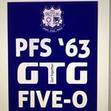Farouk Gulsara's Blog, page 132
February 10, 2018
Gestures and salutations?
 Credit: thenewsminute.comIt was a Saturday night, and I was sitting smack in the middle of a temple going late 40s and an early 50s group. They had earlier decided to let their hair down and to indulge in the intoxicating bright nocturnal lights of capitalism and its lure. As the night slithered away into the darkness, their topics of idle banter started becoming more philosophical. From Malaysian politics and the lethargic state of affairs in the country, they ventured into the wisdom of the Vedanta.
Credit: thenewsminute.comIt was a Saturday night, and I was sitting smack in the middle of a temple going late 40s and an early 50s group. They had earlier decided to let their hair down and to indulge in the intoxicating bright nocturnal lights of capitalism and its lure. As the night slithered away into the darkness, their topics of idle banter started becoming more philosophical. From Malaysian politics and the lethargic state of affairs in the country, they ventured into the wisdom of the Vedanta.Somebody started talking about the symbolic gestures of deference amongst Hindus of touching or slightly signalling towards the feet of someone elder. It may a signal of deferring to the great soul that resides in the physical body of the one being touched. The soul has achieved so much, and the younger newbie submits humbly in awe.
There are some who refuse to touch the feet. They believe that everyone carries their sins and evil deeds of their past lives in the lowest part of the lower extremities. In other words, we drag our misdeeds all through our short existence on Earth. When the younger touches the toes of the elder, some of the younger's lousy karma apparently transfers to the older person. The elder, after accumulating so much of bad points in the current life, by just being alive, the last thing they want is more Karmic baggage.
Of course, others decline to be given such high salutations as they are not worthy.
There are no arguments when it comes to the reverence of the dead. Everyone is willing to transfer the black marks of their tainted pasts. The dead cannot refuse.
Then, the topic went to the decorum of who can touch whom. It seems that mothers should not allow their pretty female offspring to reach the feet of holy men of blessings. It was just not done. A No-No. Period. A young girl with no blood relations to the recipient should not think of being blessed by an older unrelated man (especially there is no objection to conjugal desires!). And the crowd went blank on why a restriction should come about. That is when I put in my two cents worth of input.
There are groups of people who get pleasurable vibes by tactile stimulation of toes. In other words, they may have toe fetishism. Well, you do not want to display affection and arousal in public. What is more, if you are a holy man.
And I ask myself why I do not have friends! I should be asking why do they even friend me!
P.S., Of course, everyone has their own version regarding the restrictions of young girls touching elders' feet. One is related to energy generated by the female gender. Their bodies exude so much energy doing multiple hormonal functions that they could do without additional energy. Others compared young ladies to Goddess Lakshmi that they cannot be made to show respect. Well, they sure do not respect women in domestic violence cases and in local laws that are overtly patriarchal and discriminatory against the fairer gender!
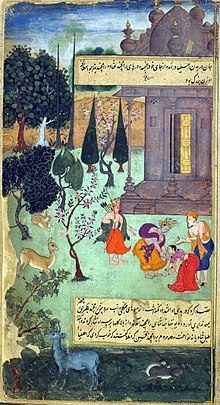 Ahalya falls at Rama's feet in gratitude for her liberation from Guatama's
Ahalya falls at Rama's feet in gratitude for her liberation from Guatama'scurse. Note the Urdu/Persian script. Guatama, an elderly sage, cursed his
young two-timing wife Ahalya to be turned to stone. She was, of all people,
seduced by Lord Indra himself. Indra had tricked Ahalya by appearing in
the image of her husband. Ahalya, knowing of his deception, willingly just
played on.
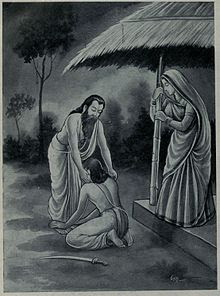 A young man displays pranama to an elderly.
A young man displays pranama to an elderly.A procrastinator, Chirakari, salutes his father, Guatama for not carrying out his duties a son.
A furious Guatama had ordered his son to kill his mother. The ever over-thinking delayed his
action by weighing the merits and demerits of not executing his father's orders and the evil
of killing his own flesh. Procrastination proved useful as Guatama soon regretted his rash
decision and was glad that his son had indeed not killed his mother. Earlier, Guatama had discovered that his wife, Ahalya, Chirakari's mother, had wronged him.https://asok22.wixsite.com/real-lessonhttp://asok22.wix.com/rifle-range-boy
http://.facebook.com/farouk.gulsara
www.riflerangeboy.com

Published on February 10, 2018 08:05
February 8, 2018
Disposable!
Pulsagari (North Korean; 1985)
Director: Shin Sang-ok
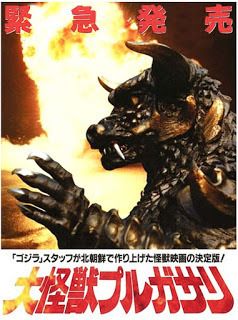
Although we have hardly heard of North Korea (NK)'s indulgement in the celluloid industry, The Supreme Leaders of the Democratic People's Republic of Korea, Kim Jong-Un and Kim Jong-Il before him, are movie buffs. The elder was so desperate to bring his country's movies to the international arena (and to make propaganda films) that Jong-Il kidnapped South Korea's famous film icons of the 60s, Shin Sang-ok and his ex-wife Choi Eun-hee for this purpose.
In 1979, Choi went missing in Hong Kong. Shin was the prime suspect in her disappearance. In trying to investigate her vanishing, he was kidnapped by Kim's men and whisked off to NK. Here, Shin found Choi safe and sound. After series of torture and rehabilitation exercise, Shin decided that the best way to escape was to play ball. Both Choi and Shin soon became a feature in NK high society. He was coaxed to make about 7 movies, of which Pulsagari is one. A year later, in Vienna, both of them sought asylum. Pulsagari is basically a rip-off of Godzilla. Even though the backstory behind this sci-fi sounds more interesting than the flick, the storyline does carry some sobering thoughts.
It tells of an evil emperor who tortures his subjects. The already resources-depleted mountain dwelling community is harassed for taxes. When money became scarce, the King's generals demand their metal utensils, hoe, rakes, pots, pans and knife to be smelt to be made weapons. The villagers resisted. The head was imprisoned and tortured. Before dying, the leader moulded a figurine of a fabled monster named Pulsagari and breathed life into it.
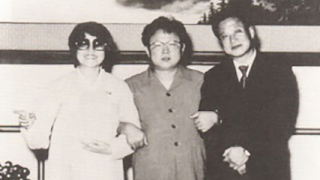 Pulsagari was discovered by the villagers, and soon they realised that the cute little monster was very much alive and thrived on iron. It was just handy as it fast gobbled up all the enemies' arsenal. Pulsagari was a saviour who saved the villagers from the tyranny of the iron-fisted rulers. It became bigger with more iron-feed. When the war was over, and the foes were defeated, the villagers had a bigger problem in their hand. Pulsagari's ferocious appetite could not keep up with the availability of iron in the village. Ironically, the saviour became the demander. The only way to reach sanity was to just kill off Pulsagari!
Pulsagari was discovered by the villagers, and soon they realised that the cute little monster was very much alive and thrived on iron. It was just handy as it fast gobbled up all the enemies' arsenal. Pulsagari was a saviour who saved the villagers from the tyranny of the iron-fisted rulers. It became bigger with more iron-feed. When the war was over, and the foes were defeated, the villagers had a bigger problem in their hand. Pulsagari's ferocious appetite could not keep up with the availability of iron in the village. Ironically, the saviour became the demander. The only way to reach sanity was to just kill off Pulsagari!
The hidden message here is that in life everybody has a shelf-life. No one is indispensable. They are sent to be Earth to perform a specific pre-ordained mission. What that is, is anybody's guess. After that is done, we have to just fade away into the sunset rather than to be a burden to the soil that supports us. Funny, Kim did not see the moral staring in the face of its viewers. I guess the joke must be on him.
Hear a podcast of the experience of the South Koreans on the other side of the 38th parallel... On 'This American Life'.https://www.thisamericanlife.org/556/same-bed-different-dreams/act-onehttp://asok22.wix.com/rifle-range-boy
http://.facebook.com/farouk.gulsara
www.riflerangeboy.com
Director: Shin Sang-ok

Although we have hardly heard of North Korea (NK)'s indulgement in the celluloid industry, The Supreme Leaders of the Democratic People's Republic of Korea, Kim Jong-Un and Kim Jong-Il before him, are movie buffs. The elder was so desperate to bring his country's movies to the international arena (and to make propaganda films) that Jong-Il kidnapped South Korea's famous film icons of the 60s, Shin Sang-ok and his ex-wife Choi Eun-hee for this purpose.
In 1979, Choi went missing in Hong Kong. Shin was the prime suspect in her disappearance. In trying to investigate her vanishing, he was kidnapped by Kim's men and whisked off to NK. Here, Shin found Choi safe and sound. After series of torture and rehabilitation exercise, Shin decided that the best way to escape was to play ball. Both Choi and Shin soon became a feature in NK high society. He was coaxed to make about 7 movies, of which Pulsagari is one. A year later, in Vienna, both of them sought asylum. Pulsagari is basically a rip-off of Godzilla. Even though the backstory behind this sci-fi sounds more interesting than the flick, the storyline does carry some sobering thoughts.
It tells of an evil emperor who tortures his subjects. The already resources-depleted mountain dwelling community is harassed for taxes. When money became scarce, the King's generals demand their metal utensils, hoe, rakes, pots, pans and knife to be smelt to be made weapons. The villagers resisted. The head was imprisoned and tortured. Before dying, the leader moulded a figurine of a fabled monster named Pulsagari and breathed life into it.
 Pulsagari was discovered by the villagers, and soon they realised that the cute little monster was very much alive and thrived on iron. It was just handy as it fast gobbled up all the enemies' arsenal. Pulsagari was a saviour who saved the villagers from the tyranny of the iron-fisted rulers. It became bigger with more iron-feed. When the war was over, and the foes were defeated, the villagers had a bigger problem in their hand. Pulsagari's ferocious appetite could not keep up with the availability of iron in the village. Ironically, the saviour became the demander. The only way to reach sanity was to just kill off Pulsagari!
Pulsagari was discovered by the villagers, and soon they realised that the cute little monster was very much alive and thrived on iron. It was just handy as it fast gobbled up all the enemies' arsenal. Pulsagari was a saviour who saved the villagers from the tyranny of the iron-fisted rulers. It became bigger with more iron-feed. When the war was over, and the foes were defeated, the villagers had a bigger problem in their hand. Pulsagari's ferocious appetite could not keep up with the availability of iron in the village. Ironically, the saviour became the demander. The only way to reach sanity was to just kill off Pulsagari!The hidden message here is that in life everybody has a shelf-life. No one is indispensable. They are sent to be Earth to perform a specific pre-ordained mission. What that is, is anybody's guess. After that is done, we have to just fade away into the sunset rather than to be a burden to the soil that supports us. Funny, Kim did not see the moral staring in the face of its viewers. I guess the joke must be on him.
Hear a podcast of the experience of the South Koreans on the other side of the 38th parallel... On 'This American Life'.https://www.thisamericanlife.org/556/same-bed-different-dreams/act-onehttp://asok22.wix.com/rifle-range-boy
http://.facebook.com/farouk.gulsara
www.riflerangeboy.com

Published on February 08, 2018 08:01
February 6, 2018
Fear of the unknown?
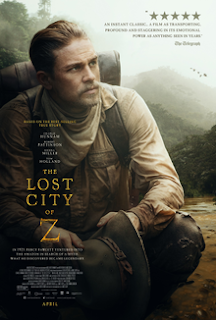 The Lost City of Z (2017)
The Lost City of Z (2017)
It was a time when wealthy British aristocrats would amuse themselves with risky expeditions to savage lands to examine the lesser beings in 'uncivilised' territories. They would study them like guinea pigs, record their habits for future references and in the process rob them blind of precious metals and of a rich civilisation. It was a time just before the onset of World War One and Major Percy Fawcett is seconded to the Royal Geographical Society to do some surveying work in the interiors of Bolivia.
Fawcett does his work and returns but not without realising that, unlike his contemporaries who think that the Amazon natives are anything but civilised, he feels the land holds the remnants of an advanced culture.
After a failed return trip to discover the lost city that he calls 'Z', his life gets embroiled in the Trench War. Injured, he is refrained from pursuing any further expeditions. The calling proved too strong. On the insistence of his eldest son, he made a final attempt to the lost city. The fate and whereabouts of both of these explorers remain a mystery till today. Multiple search parties returned empty-handed. The consensus among most lies between being killed by natives and living blissfully with the natives.
Even though the film is quite slow moving, it did manage to create the tension of the conflict of a man having to decide between leaving behind a young family and missing the crucial growing years of his children, as these expeditions take years altogether, and wanting to achieve something in his life. Should you attempt the hold more than you can grasp or be happy with the strand of straws that you have? Should we let fear of the unknown determine our future? Should we be content with our lives? Is there a limit to satiety? Is contentment the panacea for all evils in the world?http://asok22.wix.com/rifle-range-boy
http://.facebook.com/farouk.gulsara
www.riflerangeboy.com

Published on February 06, 2018 09:19
February 4, 2018
Bad moon rising?
 It was not just another day. It was a day of jubilation, the day Murugan defeated the asura Suryapadman. Coincidentally, it was also the day of the blue moon showed it fiery side after being engulfed by the dragon. When my mother was a little girl, people devoid of scientific knowledge used to tell that it was a transient event when Mother Nature, tired of holding the Earth all these while, decided to switch hands. Now we know it is the lunar eclipse. If the Supreme Mother is indulged in such gravity-defying task, it is inappropriate for mortals in merrymaking activities including eating and enjoying the outdoors.
It was not just another day. It was a day of jubilation, the day Murugan defeated the asura Suryapadman. Coincidentally, it was also the day of the blue moon showed it fiery side after being engulfed by the dragon. When my mother was a little girl, people devoid of scientific knowledge used to tell that it was a transient event when Mother Nature, tired of holding the Earth all these while, decided to switch hands. Now we know it is the lunar eclipse. If the Supreme Mother is indulged in such gravity-defying task, it is inappropriate for mortals in merrymaking activities including eating and enjoying the outdoors.In those days, and even now, the event is marked inauspicious. These days, in spite of our technological know-how, the society has somehow paradoxically have re-discovered the splendour of the age-old lost wisdom. They have combined it with current knowledge and try to give it a rational explanation to our ancestors' practices. Substantial changes in the electromagnetic charges restrict people to stay indoors.
With that in mind, all activities were kept to a minimum. Dinner was served, and the kitchen was closed before the onset of the eclipse. Everyone was forced to remain indoors, no TV, no loud music; possibility hallmarks of abstinence from merrymaking. While waiting for the time to pass, what do I receive? A phone call from the hospital of an imminent arrival of a baby. Apparently, the stork had been diligent in his duties. Keeping up my dharma, he rushed to the scene. If everything is pre-determined and happens under the watchful eyes of the Almighty, surely He would not be amused if one shirks his duties on the Makers' account.
Despite all the hullaballoo surrounding the turns of events surrounding the child's delivery amongst a specific circle of people, the mother was ignorant of its significance. As far as she can see it is a joyous event. Her nine months' wait is over, and joy spills in abundance in her young family.
For one group of people (Hindus), there had been a lot of debates and arguments about the lunar eclipse. They were arguing on the merits and appropriateness of keeping the temple open at this time as it was also Thaipusam on that day. Self-proclaimed pandits with their half-baked certainly kept life interesting as the suspense built up to the event with their 'discoveries'. For others, it was just another marvel of the world we live in. They just tell themselves that they are happy to be alive. They humble themselves by immersing themselves in the splendour and beauty of Nature. Still some stare in awe at the ability of the human mind to calculate and predict so accurately that such an event will happen and precisely at a specified time. Splendid!
http://asok22.wix.com/rifle-range-boy
http://.facebook.com/farouk.gulsara
www.riflerangeboy.com

Published on February 04, 2018 08:01
February 2, 2018
It comes around eventually!
The Postman Always Rings Twice (1946)
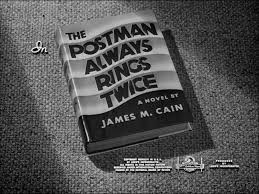 They say that there is no such thing as the perfect crime. Even when a seemingly seamless crime is committed, somehow something would go awry. A slight oversight, a chance DNA evidence or worse still when it involves two or more partners in crime, mutual suspicion and fear of double-crossing would spur one of them to act silly to arouse suspicion of the unsuspecting. The criminals occasionally appear at the crime scene to look at his 'trophy'.
They say that there is no such thing as the perfect crime. Even when a seemingly seamless crime is committed, somehow something would go awry. A slight oversight, a chance DNA evidence or worse still when it involves two or more partners in crime, mutual suspicion and fear of double-crossing would spur one of them to act silly to arouse suspicion of the unsuspecting. The criminals occasionally appear at the crime scene to look at his 'trophy'.
Nature has its own way of punishing the perpetrator. Even though its fixing of things may not appear clear-cut, at the end of the day, one can feel that poetic justice is served. Nature has a cruel sense of humour and warped amusement standards. Balance is maintained, nevertheless.
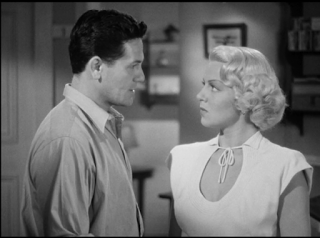 This classic film noir, made in 1946 and acted by John Garfield and the vivacious and sultry Lana Turner, grasps your attention from the word go. The first-person background narration and loud background music add on to the suspense and the unpredictability of both characters on their next move. It starts with a rolling stone, Frank Chambers, stopping at a diner to work as a helping hand. There is an instant attraction to the owner's young and flirtatious wife, Cora. One thing leads to another, and a plot to murder the filling station owner - husband is hatched and executed successfully in a planned accident.
This classic film noir, made in 1946 and acted by John Garfield and the vivacious and sultry Lana Turner, grasps your attention from the word go. The first-person background narration and loud background music add on to the suspense and the unpredictability of both characters on their next move. It starts with a rolling stone, Frank Chambers, stopping at a diner to work as a helping hand. There is an instant attraction to the owner's young and flirtatious wife, Cora. One thing leads to another, and a plot to murder the filling station owner - husband is hatched and executed successfully in a planned accident.
After this, the plot becomes twisted where the members of the legal profession try to confuse Cora and Chambers. For the first time, Frank hears about an insurance policy bought under the husband's name. Here, the story attempts to take a jab at the legal profession. It shows how the court makes a charade of the charge, admission of guilt and leniency.
The ensuing tension between Frank and Cora is illustrated beautifully in the rest of the movie to give real meaning to the title of the film. Just like how we always hear the postman's second ring of the doorbell, fate has a sure way to trap us in our mistakes. We cannot run away from our wrongdoings.http://asok22.wix.com/rifle-range-boy
http://.facebook.com/farouk.gulsara
www.riflerangeboy.com
 They say that there is no such thing as the perfect crime. Even when a seemingly seamless crime is committed, somehow something would go awry. A slight oversight, a chance DNA evidence or worse still when it involves two or more partners in crime, mutual suspicion and fear of double-crossing would spur one of them to act silly to arouse suspicion of the unsuspecting. The criminals occasionally appear at the crime scene to look at his 'trophy'.
They say that there is no such thing as the perfect crime. Even when a seemingly seamless crime is committed, somehow something would go awry. A slight oversight, a chance DNA evidence or worse still when it involves two or more partners in crime, mutual suspicion and fear of double-crossing would spur one of them to act silly to arouse suspicion of the unsuspecting. The criminals occasionally appear at the crime scene to look at his 'trophy'.Nature has its own way of punishing the perpetrator. Even though its fixing of things may not appear clear-cut, at the end of the day, one can feel that poetic justice is served. Nature has a cruel sense of humour and warped amusement standards. Balance is maintained, nevertheless.
 This classic film noir, made in 1946 and acted by John Garfield and the vivacious and sultry Lana Turner, grasps your attention from the word go. The first-person background narration and loud background music add on to the suspense and the unpredictability of both characters on their next move. It starts with a rolling stone, Frank Chambers, stopping at a diner to work as a helping hand. There is an instant attraction to the owner's young and flirtatious wife, Cora. One thing leads to another, and a plot to murder the filling station owner - husband is hatched and executed successfully in a planned accident.
This classic film noir, made in 1946 and acted by John Garfield and the vivacious and sultry Lana Turner, grasps your attention from the word go. The first-person background narration and loud background music add on to the suspense and the unpredictability of both characters on their next move. It starts with a rolling stone, Frank Chambers, stopping at a diner to work as a helping hand. There is an instant attraction to the owner's young and flirtatious wife, Cora. One thing leads to another, and a plot to murder the filling station owner - husband is hatched and executed successfully in a planned accident.After this, the plot becomes twisted where the members of the legal profession try to confuse Cora and Chambers. For the first time, Frank hears about an insurance policy bought under the husband's name. Here, the story attempts to take a jab at the legal profession. It shows how the court makes a charade of the charge, admission of guilt and leniency.
The ensuing tension between Frank and Cora is illustrated beautifully in the rest of the movie to give real meaning to the title of the film. Just like how we always hear the postman's second ring of the doorbell, fate has a sure way to trap us in our mistakes. We cannot run away from our wrongdoings.http://asok22.wix.com/rifle-range-boy
http://.facebook.com/farouk.gulsara
www.riflerangeboy.com

Published on February 02, 2018 08:30
January 31, 2018
Trust and Conviction
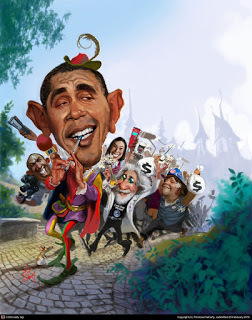 cgsociety.orgI heard a strange comparison between cryptocurrency and religion the other day.
cgsociety.orgI heard a strange comparison between cryptocurrency and religion the other day.When we look at the number of people who invest a significant amount of their hard-earned savings into multiple blockchain technology schemes, we sometimes wonder what makes people place so much trust into something so intangible. How many times in the history of man have we seen promises of easy wealth through a yet another newer and more novel way to beat the system? How predictably have the bubble repeatedly burst when people, like rats, followed Piped Piper to the caves?
Even with the knowledge of previous mayhems and follies, with their great reluctance to be detached from their world material wealth, the promise of multiplying their already burgeoning opulence is too much to resist.
There is no central control, hence the lure of concealment. There must be a reason the Blockchain technology is cryptic. Is going to be so mysterious that everything may just go up kaboom into thin air? There is nothing to claim possession, just a series of an algorithm to assert ownership. Right now, the proprietor can just sleep well convincing himself that he may be superrich one day. The day of a real cashless society who would pay for their coffee with Bitcoin is quite remote. It is a promise, no doubt, it may materialise one day, but till then, it is just promises written on water!
What do you know? The premise of religion is not much different from the above. The tenet of most religious practices is based on trust. The conviction that the elders in their faith have discovered a path to protect their interest when their time on Earth is up. That the promise of a figure who would be just out there judging our souls after keeping a tab on our good deeds whilst on Earth.
In both cases, there are no documents to uphold our interests on the day of reckoning. The future rests on mutual trust and blind faith that things will be all alright!http://asok22.wix.com/rifle-range-boy
http://.facebook.com/farouk.gulsara
www.riflerangeboy.com

Published on January 31, 2018 12:32
January 29, 2018
Precode Hollywood
Published on January 29, 2018 08:10
January 27, 2018
Do you want to leave your legacy?
 Historical Monument of Kalinga at Dhauli.The ferocious Emperor Asoka was moved bythe crimson hue of the river water nearby.Only then did the realisation of his tyrannycame fore. He became a pacifist, a Buddhistand built stupas and pillars to remindhimself and his subjects on the value of life.They keep telling me that I am insignificant; that I am inconspicuous to the grander scheme of things around; that I am just passing through. My existence in time is less than a millimicrosecondth of the 13.8 billion years since the time Big Bang happened. They ask me to be humble, to bow to the forces of Nature and to remember that I am weak; all just flesh, blood and bone. I am so brittle, organic and living on borrowed time. At the bat of an eyelid, I may be down and out. I remain but just dust, a part of the galaxy. I am told to invoke the blessings of the celestial bodies that govern our every move and not to incur their wrath.
Historical Monument of Kalinga at Dhauli.The ferocious Emperor Asoka was moved bythe crimson hue of the river water nearby.Only then did the realisation of his tyrannycame fore. He became a pacifist, a Buddhistand built stupas and pillars to remindhimself and his subjects on the value of life.They keep telling me that I am insignificant; that I am inconspicuous to the grander scheme of things around; that I am just passing through. My existence in time is less than a millimicrosecondth of the 13.8 billion years since the time Big Bang happened. They ask me to be humble, to bow to the forces of Nature and to remember that I am weak; all just flesh, blood and bone. I am so brittle, organic and living on borrowed time. At the bat of an eyelid, I may be down and out. I remain but just dust, a part of the galaxy. I am told to invoke the blessings of the celestial bodies that govern our every move and not to incur their wrath.This message of humility is apparently applicable only to some. It is shoved down the throats of lesser beings who are powerless and have to forever live on the goodwill of the crumbs from the mighty, the courageous and the wealthy. Social and moral mores are not applicable to them. They can act without impunity till death do them apart, or the Agent Intellect shine the ray of wisdom on them.
When their Consciousness becomes more manifest, they will insist that they are reformed and be given a new slate and a new lease on life. With their unholy earning, they would kosher it with mammoth structures to remind mortals that they are nothing. They would be anything but humble.
But then these megalomaniacs are the ones that history remembers. The average Joe whose existence follows the actual path of moderation as preached by the elders hardly matters to the more important direction of the human civilisation. Their lives are quickly forgotten.
My assertion is that rules only apply to the weak. The valiant segment of the population is exempt from the common rules and regulations. Well, some people are more equal than others. Some leave a legacy behind, others not even their carbon print or footprint.
 Buddha statue Dhauli, Odishahttp://asok22.wix.com/rifle-range-boy
Buddha statue Dhauli, Odishahttp://asok22.wix.com/rifle-range-boyhttp://.facebook.com/farouk.gulsara
www.riflerangeboy.com

Published on January 27, 2018 08:30
January 25, 2018
Like Karma Chameleon, you come and go!
Kedi (Turkish, documentary; 2017)
Director: Ceyda Torun
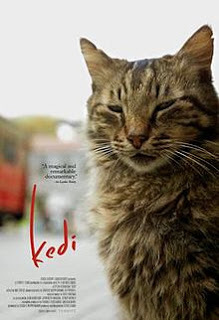 They gaze into the horizon without a care in the world. If a dog wags its tail and jumps around your legs for attention, it is because it thinks you are God. A cat, on the other hand, does not give two hoots to your presence. Cats have perfected the way to strut the posterior in front of your face in defiance in an artform humans call 'catwalk'. The cats do not think of humans as God, but instead, perceive themselves as the intermediaries to the Gods. Thanks to their ancestors who were placed on a pedestal by Queen Cleopatra and her band of rulers as well as the unique place conferred to members of the Cat Family in ancient belief systems (Al Uzza with her cat and Durga with her Bengal Tiger), cats wander with a chip on their shoulders. With their eight other lives to spare, they roam haughtily with their snouts high in the air as if breathing on imported air. Like in Boy George's 'Karma Chameleon', they come and go as they please. Unlike other domesticated animals, they managed to convince Man that they need not be leashed.
They gaze into the horizon without a care in the world. If a dog wags its tail and jumps around your legs for attention, it is because it thinks you are God. A cat, on the other hand, does not give two hoots to your presence. Cats have perfected the way to strut the posterior in front of your face in defiance in an artform humans call 'catwalk'. The cats do not think of humans as God, but instead, perceive themselves as the intermediaries to the Gods. Thanks to their ancestors who were placed on a pedestal by Queen Cleopatra and her band of rulers as well as the unique place conferred to members of the Cat Family in ancient belief systems (Al Uzza with her cat and Durga with her Bengal Tiger), cats wander with a chip on their shoulders. With their eight other lives to spare, they roam haughtily with their snouts high in the air as if breathing on imported air. Like in Boy George's 'Karma Chameleon', they come and go as they please. Unlike other domesticated animals, they managed to convince Man that they need not be leashed.
With their alluring meowing and their fluffy soft bodies, cats know they can get away with murder, but they only use their charm to cajole gullible public to depart from some mouthwatering chow.
This Turkish documentary is an exceptional presentation that would melt the hearts of any cat-lover. Using low cameras to follow the path of the stars of the film, the cats, it manages to capture many fantastic close-shots of members of the feline species. It appears that the Turkish community is quite accommodative of having stray cats wander about their streets, café, roofs and even homes. The shows mostly try to outline the daily routines of many street cats while taking many striking photographs of these sly animals. As it is mentioned in this offering, cats offer comfort to the anxious and weak souls. It redefines the meaning of our existential presence. They may open our soul to accept life beings as a continuum of the Universe rather than treating animals as second-class lifeforms that do not deserve our respect or a kind of punishment of their doings in their past lives. Maybe their presence on Earth acts as a testing bed for us to place us in the karma cycle when we are done with this present life on Earth.
http://asok22.wix.com/rifle-range-boy
http://.facebook.com/farouk.gulsara
www.riflerangeboy.com
Director: Ceyda Torun
 They gaze into the horizon without a care in the world. If a dog wags its tail and jumps around your legs for attention, it is because it thinks you are God. A cat, on the other hand, does not give two hoots to your presence. Cats have perfected the way to strut the posterior in front of your face in defiance in an artform humans call 'catwalk'. The cats do not think of humans as God, but instead, perceive themselves as the intermediaries to the Gods. Thanks to their ancestors who were placed on a pedestal by Queen Cleopatra and her band of rulers as well as the unique place conferred to members of the Cat Family in ancient belief systems (Al Uzza with her cat and Durga with her Bengal Tiger), cats wander with a chip on their shoulders. With their eight other lives to spare, they roam haughtily with their snouts high in the air as if breathing on imported air. Like in Boy George's 'Karma Chameleon', they come and go as they please. Unlike other domesticated animals, they managed to convince Man that they need not be leashed.
They gaze into the horizon without a care in the world. If a dog wags its tail and jumps around your legs for attention, it is because it thinks you are God. A cat, on the other hand, does not give two hoots to your presence. Cats have perfected the way to strut the posterior in front of your face in defiance in an artform humans call 'catwalk'. The cats do not think of humans as God, but instead, perceive themselves as the intermediaries to the Gods. Thanks to their ancestors who were placed on a pedestal by Queen Cleopatra and her band of rulers as well as the unique place conferred to members of the Cat Family in ancient belief systems (Al Uzza with her cat and Durga with her Bengal Tiger), cats wander with a chip on their shoulders. With their eight other lives to spare, they roam haughtily with their snouts high in the air as if breathing on imported air. Like in Boy George's 'Karma Chameleon', they come and go as they please. Unlike other domesticated animals, they managed to convince Man that they need not be leashed.With their alluring meowing and their fluffy soft bodies, cats know they can get away with murder, but they only use their charm to cajole gullible public to depart from some mouthwatering chow.
This Turkish documentary is an exceptional presentation that would melt the hearts of any cat-lover. Using low cameras to follow the path of the stars of the film, the cats, it manages to capture many fantastic close-shots of members of the feline species. It appears that the Turkish community is quite accommodative of having stray cats wander about their streets, café, roofs and even homes. The shows mostly try to outline the daily routines of many street cats while taking many striking photographs of these sly animals. As it is mentioned in this offering, cats offer comfort to the anxious and weak souls. It redefines the meaning of our existential presence. They may open our soul to accept life beings as a continuum of the Universe rather than treating animals as second-class lifeforms that do not deserve our respect or a kind of punishment of their doings in their past lives. Maybe their presence on Earth acts as a testing bed for us to place us in the karma cycle when we are done with this present life on Earth.
http://asok22.wix.com/rifle-range-boy
http://.facebook.com/farouk.gulsara
www.riflerangeboy.com

Published on January 25, 2018 08:01
January 24, 2018
JFK: As The World Turns
As it happened on 22nd November 1963...
https://mobile.nytimes.com/2013/11/24/arts/television/as-the-world-turns-interrupted-by-kennedys-shooting.html?referer=https://www.google.com.sg/

The Day the World Stopped Turning‘As the World Turns’ Interrupted by Kennedy’s Shooting
Clockwise from top left, Helen Wagner and Santos Ortega in the episode of “As the World Turns” that was interrupted by a CBS News Bulletin, as Walter Cronkite began reporting on Kennedy’s assassination. Cronkite’s updates were followed by commercials, like one for Nescafé.PHOTOGRAPHS FROM CBSBy THOMAS VINCIGUERRANOVEMBER 22, 2013
As usual, on that Friday afternoon, Mable Snodgrass, a 19-year-old first-time mother, was at home in Echols, Ky., watching “As the World Turns.” Ten minutes in, at about 12:40 p.m., the soapy drama was bubbling. Nancy Hughes, played by Helen Wagner, had just told Grandpa (Santos Ortega) that her son, Bob, had invited his ex-wife, the scheming Lisa, and their young son, Tom, to Thanksgiving dinner.
After his initial shock, Grandpa ventured, “That was real nice of the boy.”
“And I’ve thought about it,” Nancy said, “and I gave it a great deal of thought, Grandpa ——”
At that instant, Nancy and Grandpa were wiped off the screen, replaced by the words “CBS News Bulletin” slide and the urgent voice of Walter Cronkite.
“I was fixing to get angry because they were screwing up my show,” Ms. Snodgrass recalled. “And then I found out it was about the president.”
Americans of a certain age remember where they were when they learned of the shooting of John F. Kennedy on Nov. 22, 1963. But no group was united in quite the same way just then as those who were tuned to “As the World Turns.”
Fifty years ago, “A.T.W.T.,” as it came to be known, was not merely television’s most popular daytime drama. At the moment of the assassination, the slow-moving series about personal and professional goings-on in fictional Oakdale, Ill., was the only regular program being broadcast nationally by a major network — specifically, throughout the Eastern and Central time zones. In Washington, the NBC and ABC affiliates were scheduled to present “TV Beauty School” and “Divorce Court.” In Dallas, a discussion of winter coats with hidden zippers was the focus of “The Julie Benell Show,” a local effort by the ABC affiliate WFAA.
Today, the live telecast of “As the World Turns” No. 1,995 (there was no title) remains frozen in time as a last semblance of normalcy before the face of television changed permanently. The very ordinariness of Wagner’s scene — “my dubious claim to fame,” the actress once called it — underscores the day’s nightmarish events.
“Look at that conversation between Nancy and Grandpa,” said Lynn Liccardo, the author of the e-book “as the world stopped turning ...” “They’re dusting books. And then he gets a cup of coffee.”
Was that conversation between Nancy and Grandpa important? No, said Sam Ford, a great-nephew of Ms. Snodgrass’s and co-editor of “The Survival of Soap Opera: Transformations for a New Media Era.” “There’s rarely one scene in a soap opera that’s ever pivotal, because there is so much redundancy built in.”
An uninterrupted version of the episode is preserved at the Paley Center for Media, in New York and Los Angeles. In it, Nancy boldly predicts that Bob and Lisa will reunite.
But it is the fragmented version, available on YouTube, that has gone down in TV history. Among other things, it offers the bizarre sight of Cronkite’s dire updates being followed by cheery commercials for Nescafé instant coffee (opening, ominously, with a slowly swinging pendulum) and Friskies puppy food. In those first few frantic minutes, CBS programmers were scrambling. So were those on the soap opera set at the Hy Brown studios on West 26th Street in Manhattan.
Don Hastings, who played Bob Hughes, knew something was amiss as he prepared for a restaurant scene with Henderson Forsythe after the Nancy-Grandpa exchange.
Mr. Hastings, 79, recalled: “Phil Polansky, our cameraman, said, ‘Don’t tell the actors what? The president’s been shot?’ He had headphones on, and he was talking to the control room. We got our cue and we just kept going, because no one else knew what to do.” Mr. Hastings was unaware that the news was already blacking out the first half of his scene.
The show’s last act, with Eileen Fulton as Lisa Hughes tensely phoning her mother, Alma (Ethel Remey), about a deposit on an apartment, as well as her and Bob’s mutually lingering love, was pre-empted entirely. By then, the crew had heard about Dallas. Ms. Fulton hadn’t.
“I had a very emotional scene,” the actress, now 80, recalled. “When we finished, my cameraman, Joe Hallahan, had tears running down his face. I said, ‘I’m good, but I didn’t know I was that good.’ ”
When the show wrapped shortly before 2 p.m., “the studio went absolutely dark, which must have been some security thing,” Mr. Hastings said. “The monitors went out, and we had no communication with CBS except through a guard on the floor who had a radio.”
The soap’s scheduled episode was canceled on Monday, Nov. 25, amid CBS’s continuing news coverage. One line of that episode’s unused script holds special poignancy: “A dream can be aborted before it’s even born.”
Edward Trach, the supervising producer of the soap opera for the sponsor, Procter & Gamble, said, “When we were able to get back on the air, we tried to do so in a coherent and dramatically effective manner.”
But on that Monday afternoon, when the cast assembled to read through and time Tuesday’s segment, it was hard to focus. Mr. Hastings ducked repeatedly into the control room to watch the funeral cortege. “They kept coming to get me, because I was just destroyed at that point,” he said.
Rosemary Prinz, who played his sister, Penny, hoped for some on-air reference to the killing. But Irna Phillips, the show’s all-powerful creator, wanted no outside intrusion on the make-believe of Oakdale. “She was the meanest bitch on the planet, and you can quote me,” Ms. Prinz, now 82, said.
Ms. Prinz, who still wells up when recalling the assassination, eventually saw her chance during a scene with Mr. Ortega.
“I was supposed to go on about Tom and his father,” she recalled, “and I said instead: ‘Oh, Grandpa, here we are talking about little Tom. My God, after what the country has gone through, it seems so out of proportion. But, of course, we have to go on.’ Santos had very, very round eyes, which he always opened wide as Grandpa anyway, and he opened them even wider.”
An infuriated production team promptly descended on Ms. Prinz. She was unfazed.
“I said, ‘I just went blank and said the first think I could think of, and then I got back to the script.’ Everyone knew I was full of it. But I made the point.”http://asok22.wix.com/rifle-range-boy
http://.facebook.com/farouk.gulsara
www.riflerangeboy.com
https://mobile.nytimes.com/2013/11/24/arts/television/as-the-world-turns-interrupted-by-kennedys-shooting.html?referer=https://www.google.com.sg/

The Day the World Stopped Turning‘As the World Turns’ Interrupted by Kennedy’s Shooting
Clockwise from top left, Helen Wagner and Santos Ortega in the episode of “As the World Turns” that was interrupted by a CBS News Bulletin, as Walter Cronkite began reporting on Kennedy’s assassination. Cronkite’s updates were followed by commercials, like one for Nescafé.PHOTOGRAPHS FROM CBSBy THOMAS VINCIGUERRANOVEMBER 22, 2013
As usual, on that Friday afternoon, Mable Snodgrass, a 19-year-old first-time mother, was at home in Echols, Ky., watching “As the World Turns.” Ten minutes in, at about 12:40 p.m., the soapy drama was bubbling. Nancy Hughes, played by Helen Wagner, had just told Grandpa (Santos Ortega) that her son, Bob, had invited his ex-wife, the scheming Lisa, and their young son, Tom, to Thanksgiving dinner.
After his initial shock, Grandpa ventured, “That was real nice of the boy.”
“And I’ve thought about it,” Nancy said, “and I gave it a great deal of thought, Grandpa ——”
At that instant, Nancy and Grandpa were wiped off the screen, replaced by the words “CBS News Bulletin” slide and the urgent voice of Walter Cronkite.
“I was fixing to get angry because they were screwing up my show,” Ms. Snodgrass recalled. “And then I found out it was about the president.”
Americans of a certain age remember where they were when they learned of the shooting of John F. Kennedy on Nov. 22, 1963. But no group was united in quite the same way just then as those who were tuned to “As the World Turns.”
Fifty years ago, “A.T.W.T.,” as it came to be known, was not merely television’s most popular daytime drama. At the moment of the assassination, the slow-moving series about personal and professional goings-on in fictional Oakdale, Ill., was the only regular program being broadcast nationally by a major network — specifically, throughout the Eastern and Central time zones. In Washington, the NBC and ABC affiliates were scheduled to present “TV Beauty School” and “Divorce Court.” In Dallas, a discussion of winter coats with hidden zippers was the focus of “The Julie Benell Show,” a local effort by the ABC affiliate WFAA.
Today, the live telecast of “As the World Turns” No. 1,995 (there was no title) remains frozen in time as a last semblance of normalcy before the face of television changed permanently. The very ordinariness of Wagner’s scene — “my dubious claim to fame,” the actress once called it — underscores the day’s nightmarish events.
“Look at that conversation between Nancy and Grandpa,” said Lynn Liccardo, the author of the e-book “as the world stopped turning ...” “They’re dusting books. And then he gets a cup of coffee.”
Was that conversation between Nancy and Grandpa important? No, said Sam Ford, a great-nephew of Ms. Snodgrass’s and co-editor of “The Survival of Soap Opera: Transformations for a New Media Era.” “There’s rarely one scene in a soap opera that’s ever pivotal, because there is so much redundancy built in.”
An uninterrupted version of the episode is preserved at the Paley Center for Media, in New York and Los Angeles. In it, Nancy boldly predicts that Bob and Lisa will reunite.
But it is the fragmented version, available on YouTube, that has gone down in TV history. Among other things, it offers the bizarre sight of Cronkite’s dire updates being followed by cheery commercials for Nescafé instant coffee (opening, ominously, with a slowly swinging pendulum) and Friskies puppy food. In those first few frantic minutes, CBS programmers were scrambling. So were those on the soap opera set at the Hy Brown studios on West 26th Street in Manhattan.
Don Hastings, who played Bob Hughes, knew something was amiss as he prepared for a restaurant scene with Henderson Forsythe after the Nancy-Grandpa exchange.
Mr. Hastings, 79, recalled: “Phil Polansky, our cameraman, said, ‘Don’t tell the actors what? The president’s been shot?’ He had headphones on, and he was talking to the control room. We got our cue and we just kept going, because no one else knew what to do.” Mr. Hastings was unaware that the news was already blacking out the first half of his scene.
The show’s last act, with Eileen Fulton as Lisa Hughes tensely phoning her mother, Alma (Ethel Remey), about a deposit on an apartment, as well as her and Bob’s mutually lingering love, was pre-empted entirely. By then, the crew had heard about Dallas. Ms. Fulton hadn’t.
“I had a very emotional scene,” the actress, now 80, recalled. “When we finished, my cameraman, Joe Hallahan, had tears running down his face. I said, ‘I’m good, but I didn’t know I was that good.’ ”
When the show wrapped shortly before 2 p.m., “the studio went absolutely dark, which must have been some security thing,” Mr. Hastings said. “The monitors went out, and we had no communication with CBS except through a guard on the floor who had a radio.”
The soap’s scheduled episode was canceled on Monday, Nov. 25, amid CBS’s continuing news coverage. One line of that episode’s unused script holds special poignancy: “A dream can be aborted before it’s even born.”
Edward Trach, the supervising producer of the soap opera for the sponsor, Procter & Gamble, said, “When we were able to get back on the air, we tried to do so in a coherent and dramatically effective manner.”
But on that Monday afternoon, when the cast assembled to read through and time Tuesday’s segment, it was hard to focus. Mr. Hastings ducked repeatedly into the control room to watch the funeral cortege. “They kept coming to get me, because I was just destroyed at that point,” he said.
Rosemary Prinz, who played his sister, Penny, hoped for some on-air reference to the killing. But Irna Phillips, the show’s all-powerful creator, wanted no outside intrusion on the make-believe of Oakdale. “She was the meanest bitch on the planet, and you can quote me,” Ms. Prinz, now 82, said.
Ms. Prinz, who still wells up when recalling the assassination, eventually saw her chance during a scene with Mr. Ortega.
“I was supposed to go on about Tom and his father,” she recalled, “and I said instead: ‘Oh, Grandpa, here we are talking about little Tom. My God, after what the country has gone through, it seems so out of proportion. But, of course, we have to go on.’ Santos had very, very round eyes, which he always opened wide as Grandpa anyway, and he opened them even wider.”
An infuriated production team promptly descended on Ms. Prinz. She was unfazed.
“I said, ‘I just went blank and said the first think I could think of, and then I got back to the script.’ Everyone knew I was full of it. But I made the point.”http://asok22.wix.com/rifle-range-boy
http://.facebook.com/farouk.gulsara
www.riflerangeboy.com

Published on January 24, 2018 08:11


